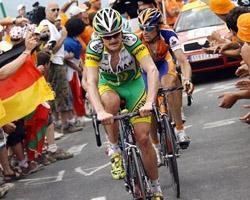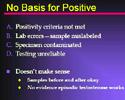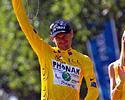
Recently on Cyclingnews.com |
News feature, May 14, 2007
Floyd's day in court approaches - salvation, or damnation?
by Laura Weislo

|
He's been waiting for this almost as much as a tough mountain stage. This week, the American cyclist Floyd Landis faces his toughest battle yet - not just to save a race, but to save his career.
When Floyd Landis walks into the Darling Trial Courtroom at Pepperdine University’s School of Law in Malibu (whose Dean is none other than Kenneth W. Starr), the cyclist enters into a process that could lead to salvation or damnation.
Or more likely, it will lead to more legal costs and hearings. But whatever the outcome, the cycling world hopes this sad, damaging case will be resolved once and for all.
Ever since he allegedly tested positive for synthetic testosterone during his 2006 Tour de France victory, the cyclist has been scathing of the process and the parties involved in that anti-doping process. While he's not attacked the sport of cycling, it's certainly been damaged as he's gone on a PR offensive in an effort to supposedly educate the public, but also garner support for his cause.
The hearings are just the next step in a very public do-or-die battle. Should Landis lose, he will become the first Tour winner to be stripped of his title for doping. The sport of cycling will suffer yet another body-blow to its credibility. Should he win, the anti-doping establishment will fall under suspicion.

|
However, it's unlikely to be the final step in the process. Landis told Cyclingnews last month that he expects the case to go to the Court for Arbitration of Sport on appeal should he win his case with USADA.
"There are opportunities for appeals, from WADA and UCI, and so there is a good possibility it will get dragged out another year - even if I win there will be another hearing most likely."
Landis insisted that his hearing be made open to the media - a move designed to pressure the arbitration panel, which has a 100% record in deciding cases against athletes, to take his argument more seriously. Landis said he has no regrets in making his case public. "I don't think there was even much consideration to do it any other way. Part of the problem was the way it was done in the beginning - the way I was basically convicted in the press. I really had very little to lose by taking it public."
Landis doesn't look at it as arguing just his own case, he sees himself fighting against a system which he views as corrupt. "If they lose this, they cease to exist. I don't see any other way," Landis said. "It would be no point in them going on." Should he fail not only will he be faced with a two year ban, and a four year ban from racing in the ProTour, he has said that he will not race again unless he wins. "I don't have any interest in serving a suspension and then racing. But, if I can't prove that I'm innocent then I'll probably quit."

|
His ride in stage 17 of the 2006 Tour de France was hailed as one of the most extraordinary solo performances in modern Tour de France history. The previous day, Landis had 'hit the wall' as he struggled to finish stage 16, losing almost 10 minutes on the general classification. Then the next day, he went on the attack in unprecedented fashion, with a 130km solo attack, pulling himself back within 30 seconds of the yellow jersey that he eventually took home.
Then, just days after the Tour was over, news that a rider had tested positive in the Tour started to circulate and let to widespread speculation, especially after Landis failed to show at a lucrative post-Tour criterium. It was soon confirmed that the positive was Landis, a high testosterone:epitestosterone ratio, and the sample in question was taken on that historic stage.
For a sport burdened with multiple doping scandals in recent years, having the winner of the Tour de France test positive was a serious issue. For the rider who tested positive, it meant the loss of large amounts of endorsement deals and prize money. For the sport, it meant the loss of team sponsors, fans, and even races. For the antidoping authorities, it was a hollow victory marred by controversy.
Before the 2006 Tour de France, the cycling world was rocked by the ongoing Operación Puerto doping scandal, and having the Tour champion test positive was like having salt poured into an open wound for the race organisation, the UCI and the riders.
"It's a catastrophe, a real disaster," said leading Belgian team manager, Patrick Lefevere. "It's a black time for cycling; this is dramatic," echoed Erik Breukink, Rabobank's manager. "If it's really true, then I don't know what to think anymore," said the experienced Australian rider, Stuart O'Grady (Team CSC), who was in a break on stage 17 that was overtaken by Landis. "It's simply nauseating," proclaimed Hans-Michael Holczer, manager of the German team, Gerolsteiner. One by one, the riders, the managers, and other officials expressed doubt and disappointment.
Landis, for his part, was blindsided by the news and pleaded with the public to consider him innocent until proven guilty. He denied using testosterone, and offered several reasons why his body might naturally have a high T:E ratio: the alcohol he drank after his disasterous stage 16, the cortisone he was allowed to use to deal with the pain of his degrading hip bone, the medication he takes to treat a thyroid condition. "I wouldn't hold it against somebody if they don't believe me," he said at the time.
For most Tour champions, the weeks following France's Grand Tour are a series of public appearances on talk shows and at lucrative post-Tour criteriums, but for Landis, those times were spent trying to save his reputation. Between the time it was announced that his A sample had traces of synthetic testosterone and the results of his B sample analysis were released, Landis hired Howard Jacobs to be his attorney.
Jacobs, who previously represented Tyler Hamilton in his blood doping case, and runner Tim Montgomery in the BALCO case, shifted Landis' party line from the defensive to the offensive. Shortly after Jacobs took over, Landis began questioning the French LNDD lab that tested his samples - the same one which released data that was alleged to show that urine samples provided by Lance Armstrong in the 1999 Tour de France showed traces of blood-boosting agent EPO.
As the summer dragged along, the implications of the Landis test results rippled through the sport. His team at the Tour de France, Phonak folded. The Vuelta Espana claimed it lost a major sponsor because of the scandal. Even domestic-level race promoters complained about the impact that doping scandals were having on their races.
After taking a break from the public eye to have his faulty hip replaced and to let his experts examine the documentation they received from the LNDD on the A and B sample analyses, Landis again went on the offensive, attacking the UCI for prosecuting his case in the press. He then went public with an online presentation prepared by his friend, Dr. Arnie Baker, which supposedly detailed errors in the processing of his sample at the LNDD laboratory. The publication of the strategy was an unprecedented and bold maneuver to sway public opinion. Labeled the 'wikipedia defense', it spawned huge debate on internet forums and inspired entire websites to be created to discuss the data - achieving the intended effect.
Already unusual in its significance and in the manner with which the case played out in the media, the Landis case also had its fair share of bizarre plot twists and strange accusations. The French police were called in to investigate forged emails being sent out with the LNDD laboratory logo - messages that were critical of the laboratory process and were alleged to have come from within the Landis camp.
WADA's outspoken chairman, Dick Pound, chimed in on the debate, saying "I mean, it was 11 to 1!" in reference to Landis' T:E ratio. "You'd think he'd be violating every virgin within 100 miles. How does he even get on his bicycle?"
This later led Landis to lodge a complaint, according to the San Jose Mercury News, to the IOC calling for Pound to be removed from his post as WADA president.
When USADA took an unprecedented step to call for the analysis of Landis' other urine samples from the 2006 Tour, ones which had been declared negative following the A sample screening, for synthetic testosterone, Landis' legal team claimed that USADA officials had conspired to keep his experts from witnessing the entire test procedure. They went on to allege that the lab had tampered with the data from the testing, claiming that "critical evidence... had been erased from the hard drive and the original data destroyed."
Finally, with only the weekend before the hearings were set to commence, Landis claimed that his legal representative had been offered a deal to give up evidence on Lance Armstrong in exchange for the lightest possible suspension.
Throughout the process, USADA has been silent, as it is forbidden from commenting on doping cases. Landis has held the upper hand in the PR battle since the initial A sample test result was leaked, but come Monday, his legal team will need to convince the three-person panel of his innocence. It is expected that the USADA will present the panel with a barrage of laboratory test results.
Dr. Christiane Ayotte, head of the Candadian WADA-accredited antidoping laboratory in Montreal, explained to Cyclingnews after the Landis online presentation emerged that testosterone is metabolised into various molecules after it is taken, and that it would be possible to follow the chemical changes in a series of samples taken over time. Presumably, this will be what USADA will attempt to show with data from the additional B-sample analyses completed last month.
At the same time, Landis and his legal team will also set out to show that not only is the laboratory in error, but the test used to determine the presence of synthetic testosterone is also unreliable. They will also question the laboratory's documentation methods and the procedures for observation of the test and release of the information.
It's possible the hearings could become bogged down in scientific arguments, but it's also predicted that the hearings could provide the setting for a greater attack against the sporting establishment. The case commences on Monday, May 14, and is expected to run for at least one week.
Cyclingnews' coverage of the Floyd Landis case
May
29, 2009 - French authorities summon Landis and Baker
September 28, 2008 - Landis
takes case to US federal court
September 10, 2008 - Landis
signing with current Health Net-Maxxis team for 2009
July 1, 2008 - CAS
delivers final blow to Landis legal challenge
June 30, 2008 - Landis
loses final appeal
June 28, 2008 - Landis
decision due Monday
March 12, 2008 - Landis'
judgment day nears
October 21, 2007 - Landis
files appeal with CAS
October 18, 2007 - AFLD
takes another look at Landis case
Thursday, October 11 -
Landis continues fight, appeals to CAS
Saturday, September 22
- UCI officially names Pereiro 2006 Tour champion, Landis case raises issues
Friday, September 21 -
Landis' appeal denied, two year suspension levied
